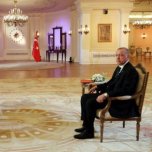Click to read the article in Turkish
Making a statement about upcoming local elections, Minister of Interior Süleyman Soylu has stated, "In the event that the ones still having relations or contact with the Kurdistan Workers Party (PKK) are elected as municipal council members, they will be suspended from duty."
Speaking in a live program on state channel TRT News, Soylu has said,
"Of the candidates nominated by the opposition, there is legal action against 178 of them on charges related to the PKK, 45 people for the FETÖ, 4 of them for extreme left organizations and 4 of them for the DEASH."
Minister Soylu has also added, "I am telling you, they cannot perform duty. As the Ministry of Interior, we are responsible for the administrative aspect. They still have relations with the PKK. They cannot work as members of municipal councils, we will suspend them all from duty."
Final candidate list announced on March 3 The candidate lists for March 31 local elections were submitted to the Supreme Election Council (YSK) until the end of business day on February 19. After examining the candidates, the YSK announced the final candidate list on March 3, 2019. |
Conditions specified in Article 11 of Law on Parliamentary Elections
The above statement of Minister Soylu has recalled to mind the Law 2972 on Elections of Local Administrations and Neighborhood Mukhtars and Board of Elderly. The Article 9 of this law stipulates the following:
"With the condition of not holding the conditions defined in Article 11 of 2839 numbered Law on Parliamentary Elections, all Turkish citizens over the age of 25 are eligible to be elected as mayor, member of municipal council and provincial council."
And what about the Law 2839 on Parliamentary Elections? What does it say about who cannot be elected as mayors, members of municipal and provincial councils? It states the following:
Article 11
The following shall be ineligible for candidature:
a) Those who do not have a primary school graduation,
b) Those placed under the care of a guardian,
c) Those who have not completed their military service (if they have such an obligation),
d) Those who are banned from civil service,
e) Those who have been sentenced to prison terms the total of which is equal to or longer than one year or those who have been convicted for an indictable offence regardless of the term of the prison sentence, except for crimes of imprudence;
f) Those who have been convicted for the following offences, even if pardoned;
1. Disgraceful offences such as embezzlement, misappropriation, bribery by a government official, bribery, theft, swindling, forgery, abuse of confidence, fraudulent bankruptcy and smuggling other than smuggling for personal use and consumption, inappropriate practices in governmental tenders, procurements or sales, or disclosure of state's secrets.
2. Committing one of the offences mentioned in the Turkish Penal Code, Second Book, First Chapter or publicly provoking such offences;
3. Expressly provoking hatred and enmity among the people on the basis of social class, racial, religious, denominational or regional differences, as described in Article 312 of the Turkish Penal Code.
4. Committing one of the offences described in Article 536 paragraph 1, 2 and 3 of the Turkish Penal Code and Article 537 paragraphs 1, 2, 3, 4 and 5 of the Turkish Penal Code for political and ideological purposes.
(EKN/SD)






